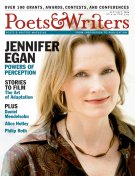Even before he was named U.S. poet laureate in June, Donald Hall was a familiar figure in contemporary poetry. During the last fifty years, he has published more than fifteen books of poetry, most recently White Apples and the Taste of Stone: Selected Poems 1946–2006 (Houghton Mifflin); and has received two Guggenheim Fellowships, the Los Angeles Times Book Prize, and the Ruth Lilly Prize, among other honors. But his recent appointment will no doubt bring him closer to the center of popular culture. After all, in June his photograph appeared on the same People page in Time magazine as Angelina Jolie's.
My advice to young poets is pretty standard: Read the old people. Read the seventeenth century.
Hall brings to the position a reputation for being outspoken, which was forged most publicly when he served as an advisory council member of the National Endowment for the Arts during George H. W. Bush's presidency. The seventy-seven-year-old poet lives with his two cats, Thelma and Louise, in Wilmot, New Hampshire, on a farm once owned by his great-grandparents. He is currently at work on a collection of poems and two prose books. Two weeks after he was chosen to succeed Ted Kooser as poet laureate, Hall spoke about his newfound responsibilities.
Laureates usually make proclamations of great intentions about advancing poetry. Have they advanced poetry?
Some of them have. Ted Kooser made two hundred appearances in two years. And he also chose a poem a week for newspapers. One hundred and forty-four newspapers [have] taken them and reprinted them. That's good, and he is going to continue doing that. I have been talking about doing radio and even television.
Had you given any thought to declining the position?
Flittingly, because I like solitude. I live alone in this house, and I like it. I have a lady friend who comes once a week. But, basically, I am alone here, not talking. The phone doesn't ring much. People know I don't like the telephone.
Did you consider declining the position as a gesture of dissent?
No. I knew this [appointment] was not [made by] the administration. I was not [to be] George Bush's poet. People have not accused me of that. At least not yet. And it's the Library of Congress. It's quite separate from the administration.
What do you make of the idea that more people write poetry than read it?
Well, that's not true. People listen to it a good deal; the poetry reading is popular. I have lived long enough so that I have seen poetry increase enormously in audience. I know that it is not so many people as go to the dog tracks one night in Florida, probably. But, when I was growing up, a book of poems by a well-known poet would be printed in an edition of one thousand hardback copies. And if that sold out in three years, it was doing pretty well. But now the same poet [with] the same sort of reputation—and there are more of them—would be printed in a first printing of eight or ten thousand. And they sell at the poetry readings. But the poetry reading is a big audience. More people attend the readings than buy the books.
Any career advice for aspiring poets?
It's a life. It's a whole life. And my advice to young poets is pretty standard: Read the old people. Read the seventeenth century; don't just read the twentieth century. Sometimes, you get the impression that people think that poetry began in 1984 or something. And read the old boys and revise. Revise endlessly. Never show a poem to anybody else until you have worked on it yourself for a couple of months.
What are you most looking forward to about this appointment?
Probably the sale of my books.
Robert Birnbaum is the editor-at-large of Identitytheory.com and a contributing writer to the Morning News. He lives in New Hampshire.








